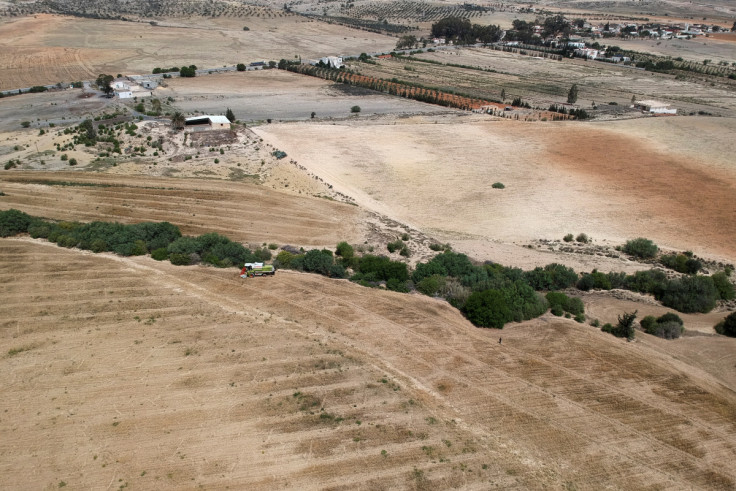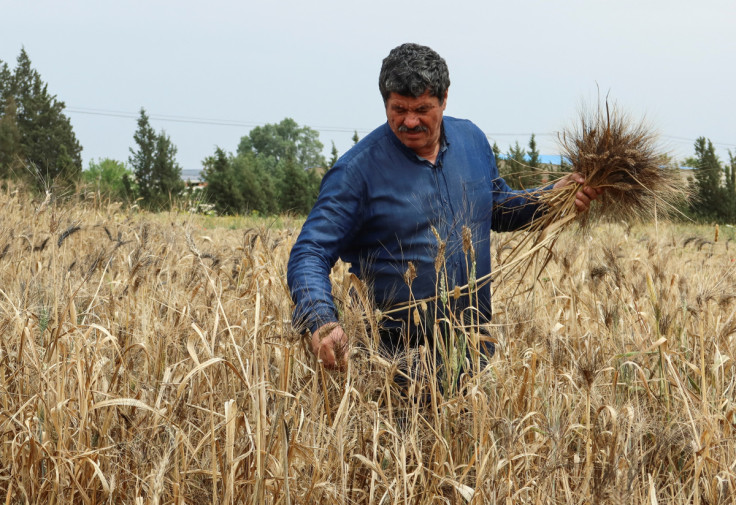As Drought Withers Tunisian Fields, State Feels Financial Pinch

As rains failed, Tunisian farmers watched their crops wither this spring, harvesting early to salvage some as animal feed and piling costs on a state struggling to afford wheat imports with bakeries running out of bread.
At his farm just outside Tunis, Hasan Chetoui stood clutching dry sheaves of wheat, the ears empty husks, after managing to save only 20 hectares of the 150 he planted.
"The authorities did not give me any water so all these ears are unusable. What can we do? They will just become fodder," he lamented, saying the current drought was worse than any he had previously known.
Three years without adequate rain are likely a result of climate change, which the World Bank has said will make Tunisia hotter and drier. The drought has emptied reservoirs, cracked the soil and led to water rationing.
While Chetoui and other Tunisian farmers despair for the financial losses they face this year, stretched state finances will also suffer. The agriculture ministry said last week the harvest would only be about 250,000 tonnes of grain this year.
Last year's harvest was 750,000 tonnes and Tunisia must this year import 95% of its grains, the agriculture ministry said. The average grains harvest over the past decade has been 1.5 million tonnes compared to consumption of 3.4 million tonnes.
Higher import costs come as the government faces a balance of payments crisis and is seeking billions of dollars in budget support from the International Monetary Fund and bilateral donors, with the talks looking stalled for now.
Bakeries are meanwhile running out of flour and have had to ration bread in recent days. Long queues have grown outside some bakeries and others have closed their doors. Shortages of other imported, or subsidised goods, have periodically hit throughout this year.
"There is a bread crisis. Every day if you want to buy bread for work or for your home you have to stand in line," said Ammar Barhoumi, waiting outside a bakery in Ariana, not far from Chetoui's farm.
The baker, Ismail Bouabdelli, said he had been to four mills seeking flour but had so little he would have to temporarily close.
FINANCIAL RESTRICTIONS
Hemmed in by financial restrictions, the government has few choices though it has tried to help farmers cope with higher costs by raising its purchase price to 140 dinars from 130 dinars for 100 grams of wheat.
Last year the World Bank granted Tunisia $130 million to help it import wheat at global prices inflated since the war in Ukraine. State mills sell the flour to bakeries that offer bread at subsidised prices.
Many Tunisians still recall with dread the deadly bread riots in 1983-84 - an event that successive governments have cited to avoid putting up prices for ordinary people, piling on problems for state finances.
Close to the presidential palace in Carthage, an ancient city that was once a major wheat supplier across the Mediterranean, fields recently lay as stubble, harvested two months early as the green stalks turned yellow and brittle.
President Kais Saied, who seized most powers in 2021 and has blamed Tunisia's economic problems on corruption in previous administrations, has demanded an end to bread shortages.
But he has not addressed the wider supply and finance problems, calling the shortages the work of "criminal networks".

© Copyright Thomson Reuters {{Year}}. All rights reserved.



















